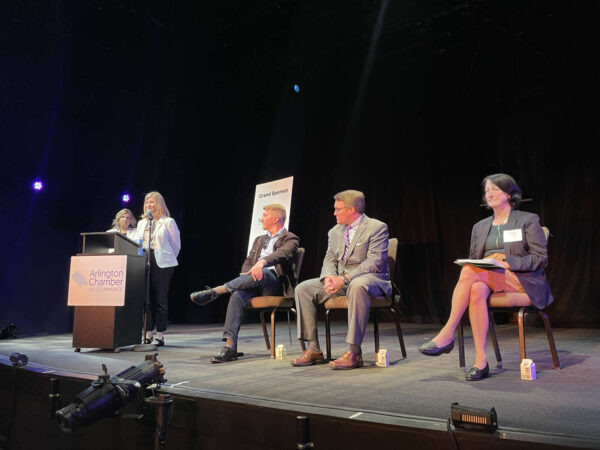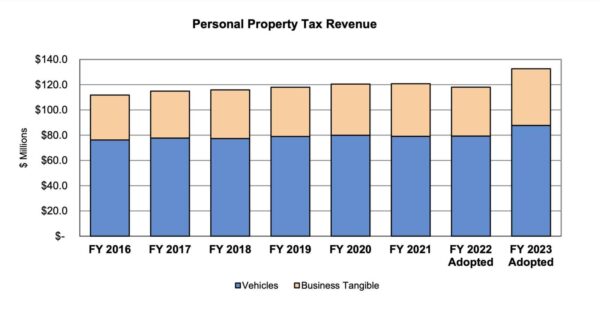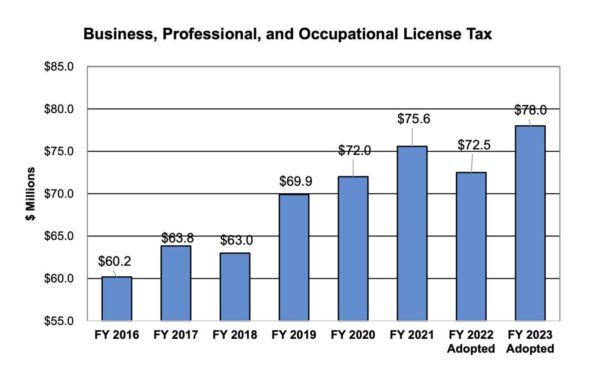
A record-high office vacancy rate plus burdensome taxes and permit processes are just some hurdles for local businesses that Arlington County Board hopefuls are pledging to tackle.
During a debate hosted by the Arlington Chamber of Commerce last night (Wednesday), incumbent Matt de Ferranti (D) and his two independent opponents, Audrey Clement and Adam Theo, explained to a 30-person audience how they would extend a helping hand toward area businesses.
Clement emphasized office-to-residential conversions as a way of reducing the office vacancy rate, which reached 20.8% in the last quarter, and “deal with our housing crisis at the same time.”
“Office-to-residential conversion is a smart approach that both Alexandria and the District of Columbia are implementing,” she said. “There are many reasons this is a sensible strategy, and Arlington’s Missing Middle is not.”
Office buildings are readily available, have more parking than most new apartment buildings and are close to Metro, she said.
“I don’t believe honestly there’s disagreement that we should do office to residential. It’s how we do it,” de Ferranti said. “We are already working on that, but we need to move more quickly.”
Seeing as empty offices are spread throughout buildings, Theo said “conversions are not a silver bullet” and suggested filling these vacancies with schools.
“That is something that’s much easier to renovate for than residential and it helps to tackle our school overcrowding that we’ll be facing over the next decade or two,” and makes more opportunities available to young families in urban areas, he said.
Currently, the county is exploring more flexible zoning in offices to allow for “light industrial” uses such as delivery staging areas, urban farms, breweries and small warehouses.
All three, meanwhile, say they would change how businesses are taxed.
“I am concerned about excessive taxation, particularly real estate taxes, but if you can start with shaving off some of those business taxes, that would be just fine with me,” Clement said.
Theo called for removing the business tangible tax, a tax levied on property used in business that requires maintaining records of nearly every item of value that a business owns.

Business tangible tax assessments are expected to increase by 16% this fiscal year, according to the 2022-23 budget. But Theo said the $40 million it netted last year is not worth squeezing support businesses with thin margins.
“The county sneezes and it spends $40 million,” he quipped.
De Ferranti advocated for increasing the threshold for Business, Professional and Occupational License (BPOL) tax, which comprises about 5% of the county’s revenue for this fiscal year, and has been steadily rising over the last decade.
Under the tax — which has long had critics both on the right and the left — businesses with revenue of less than $10,000 owe nothing, while those grossing up to $50,000 pay $30 and those grossing up to $100,000 pay $50. Beyond that, most businesses pay $0.36 per $100 in gross receipts, regardless of whether the business is profitable or not. Some businesses, like stores and restaurants, pay a lower rate while others, like printed newspapers, are exempt.

De Ferranti, however, balked at other tax cut suggestions.
“But broad statements like, ‘We should cut’ — first, our real estate tax rate is the lowest in the region,” de Ferranti said. “Our property values are so high, so that’s why our total bills are higher than some other localities. We have to keep investing when there’s a challenge in our economy.”
When asked what could be improved, Theo and de Ferranti advocated for more support to Arlington Economic Development, Constituent Services and Permit Arlington, while Clement had nothing but praise for the recently-revamped online permitting system as “the cat’s meow.”
Said de Ferranti: “For small business as a whole, I do think we can sharpen our focus on customer service,” particularly when they face unexpected crises, like power outages, or a county plan to install a bus stop encroaching on Good Company Donuts patio space.
Theo was more critical, saying the county needs to revisit the necessity of certain permits, continue adding permit types to the online system and automate the back-end so permits are approved faster.
Some local restaurateurs have chafed against Arlington’s permit process governing outdoor tents and heaters, while they tried to expand Temporary Outdoor Seating Areas (TOSAs) during the pandemic.
“We need to encourage TOSAs by making the surroundings more amenable to them,” Clement said. “There needs to be some kind of coordinated effort with the planning department to upgrade streets in our business districts or restaurant districts.”

